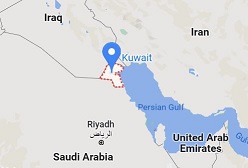The Executive Board of the International Monetary Fund (IMF) reflected on the economy of Kuwait urging for a structural reform. The call came after the IMF concluded the Article IV consultation with Kuwait and considered and endorsed the Staff Appraisal on a lapse-of-time basis without a meeting.
In its recommendation the IMF said: “…A structural reform package is needed to boost labor productivity and non-oil private sector-led growth. Strong non-oil private sector-led growth is needed to absorb new labor market entrants. This requires a comprehensive set of reforms that tackle deep-rooted structural challenges. To incentivize Kuwaitis to seek careers in the private sector, labor market reforms to promote a market-aligned wage structure are needed.”
“…Benefiting from high oil prices, Kuwait’s economic recovery continues, and inflation is contained. Non-oil GDP growth rose to an estimated 3.4 percent in 2021, benefiting from a recovery in domestic and external demand, and strengthened further to 4.0 percent in 2022. This, together with a pickup in oil production, resulted in a rebound in overall real GDP growth to 8.2 percent in 2022,” said the IMF in a statement.
“While oil GDP growth is expected to decline in 2023 due to oil production cuts, non-oil GDP growth would stay robust, driven by domestic demand, and is foreseen to remain steady over the medium term. After peaking at 4.7 percent y-o-y in April 2022, headline inflation has receded to 3.7 percent in May 2023. Subsidies on basic food items such as rice and sugar, and caps on domestic gasoline prices, helped contain inflation, as did tighter monetary policy. Core inflation (excluding food and transport items) has also been trending down since 2022Q2.”
“The fiscal and external balances have strengthened, and external buffers are increasing. The overall fiscal balance turned into a surplus of 6.5 percent of GDP in FY2021/22, while the non-oil balance (less investment income) improved by about 9 percentage points of non-oil GDP to -90.1 percent, and fiscal financing needs fell substantially.”
The IMF also stated that the fiscal surplus is estimated to have improved to 23.4 percent of GDP in FY2022/23, benefiting mainly from high oil revenues, but also from expenditure restraint which helped increase the non-oil balance by about 2 percentage points of non-oil GDP to about -88.3 percent.
“Helped by higher oil revenue, the current account surplus is estimated to have reached 33.8 percent of GDP in 2022 and is projected to remain high in 2023. Official reserve assets stood at US$48.2 billion as of end-2022 (10.4 months of prospective imports, 106.5 percent of the IMF Assessing Reserve Adequacy metric),” it said.
“Financial soundness indicators and the authorities’ stress tests suggest the banking system is stable and resilient to severe shocks. Banks are well-capitalized and highly liquid. Non-performing loans remain sufficiently provisioned. Profitability is also recovering,” said the IMF.
“The risks surrounding the baseline macroeconomic outlook are elevated and are tilted to the downside. Volatility in oil prices and production—arising from global factors—poses two-sided risks to growth and inflation, as well as to the fiscal and current account balances. A deeper global growth slowdown, possibly caused by further monetary policy tightening or banking sector stress in major advanced economies, would adversely impact Kuwait’s economy.”
Deepening geo-economic fragmentation would reduce potential growth, while structurally worsening the fiscal and current account balances, according to the IMF. “As for domestic risks, delays in needed fiscal and structural reforms could amplify the risk of procyclical fiscal policy and undermine investor confidence. Such delays would also hinder progress towards diversifying the economy, making it more vulnerable to climate transition risks. On the upside, a resolution to the political gridlock could accelerate needed fiscal and structural reforms, boosting investor confidence, and stimulating private investment,” the IMF stated.

